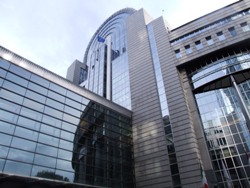Jan 19 2010
In the coming decade, Europe will be hit by abnormal heat waves more often, meaning additional air conditioning, higher energy costs and more CO2 emissions. The European Parliament did not wait for the UN climate conference in Copenhagen to set a good example.
Recently, its enormous dome-glass building was entirely covered with the sun-resistant and energy-saving Luxasolar(R) window film, developed by Belgian company Luxafoil NV. After a European call for tenders, Luxafoil turned out to be the only company that could meet the demand of reducing the carbon footprint of the European Parliament by 30% as quickly as possible. As well, FEDESCO, which acted as a third investor for the federal government in matters of energy-efficiency under the impulse of Federal Minister of Climate and Energy Paul Magnette, has had some 4,900 msquared covered with Luxasolar, including the Royal Museum, the Royal Library and the State Archives.
 European Parliament
European Parliament
In the summer, Luxasolar keeps the sun heat out at the glass, and in the winter, the heat stays in the room. Moreover, the film generates energy-savings of up to 33% for buildings with air conditioning and greatly reduces CO2 emissions. "Our spectrally selective window film consists of high-quality, laminated polyester layers fitted against the window from the inside, while the optical view remains optimal, which is why we call it 'clear view'. More importantly, it keeps 93% of infrared rays out and lowers indoor temperatures up to 10 degreesC. This makes it an ecological replacement for an air conditioning unit. Even in buildings with air conditioning, the film ensures that the energy costs of air conditioning do not go into overdrive. Sun heat up to about 22 degreesC is let in and the rest is filtered out by film. The higher the temperature, the more the temperature is lowered thanks to this intelligent film. In the winter, indoor heat, which is normally lost with large panes of glass, is kept in the room and increases the average temperature by 2 to 4degrees C, saving an average of up to 30% on heating costs, depending on the type of glass. This is also why the film is placed on the northern side of buildings. As well, 99% of the UV rays are kept out, stopping any colouration of carpets, furniture or works of art. Luxasolar can be installed on any type of glass, even diagonal glazing," explains Luc Michiels, CEO.
Source: http://www.luxasolar.eu/